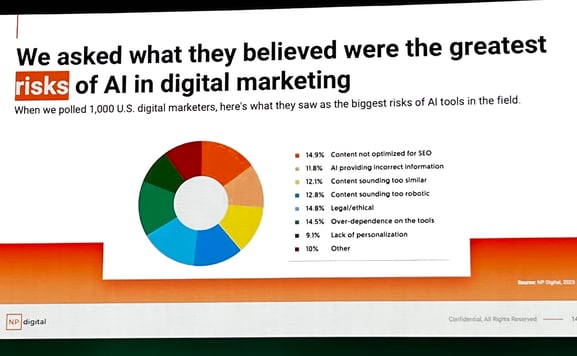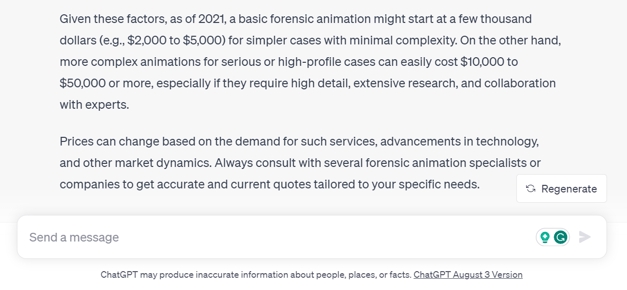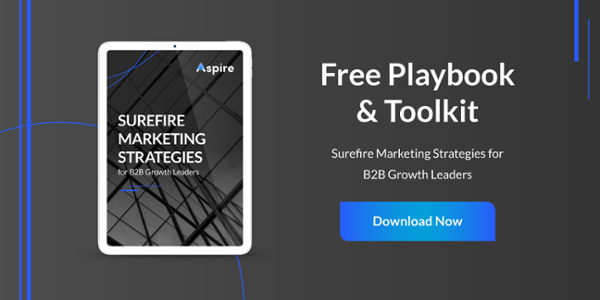- Marketing Strategy
- Artificial Intelligence (AI)
- September 10, 2023
How AI is Accelerating B2B Change: Lessons from INBOUND 2023

Aaron Marks

Even if you missed this year's INBOUND 2023 conference, you probably won't be surprised to hear about the topic du jour: Artificial Intelligence (AI). There were, of course, lots of hot takes regarding AI – some more valuable, others intentionally contrarian.
However, if you peel back the layers a bit, the real takeaway from INBOUND wasn't about AI itself, but rather the changes coming from it. In particular, the keynote from Yamini Rangan, HubSpot's CEO, stood out to me most. As Rangan pointed out, the past nine months alone have seen more technological innovations than some sectors have in almost a decade!
The underpinning point of her talk? The Information Age is nearly behind us, as we are now transitioning into the Intelligence Age. And for B2B companies, this presents a massive risk – and lots of opportunity for reward.
Industries like IT and Manufacturing have often been among the slowest to adapt to sales and marketing changes. Despite Forrester and other experts ringing the alarm bell of impending doom in B2B, companies have managed to survive and even thrive despite doing more or less the same thing they've always done.
But amid the most rapid disruption we've ever seen, thanks to AI, there's a new imperative for businesses to adapt and evolve. This article will take a look at the biggest takeaways from INBOUND 2023, and how they impact your business.
AI Disrupted Everything... and is Driving Change Faster Than Ever
While AI has been predictive for years, the advent of generative AI presents a paradigm shift. This technology isn't merely supportive but proactive – creating new content, offering insights, and even coding software. This brings a broader strategic need for businesses to not just 'keep up' with AI but to stay ahead in understanding its implications.
As Rangan pointed out, AI has a two-fold implication: speed and scale. And if you've written off AI so far because it's "not affecting your industry", you better watch out. AI is not just affecting certain industries, and it's not just changing some things; it's disrupting everything, everywhere.
The Imperative of Change for B2B Companies
Traditionally, many B2B companies have been able to "shrug off" changes, at least for a while. That's why today, you'll still find B2B companies, like in the IT or manufacturing industries, with simple informational-only websites. Due to a strong brand reputation, or an effective sales team, or lots of client referrals, many companies have been able to (at least partially) dodge the way that buying behavior has transformed in the last decade.
But this change from the Information Age to the Intelligence Age is far from a subtle shift – it's a fundamental overhaul of how businesses interact with customers. Generative AI technologies don't just predict; they actively influence buyer behavior. As a result, companies must reevaluate their strategies to accommodate a landscape where buyers are not just well-informed but exceptionally discerning and adaptive.
"Companies who focus on customer connection saw five times more growth than the average company."
- Yamini Rangan, CEO of HubSpot
The velocity at which this shift is occurring leaves a narrow frame for businesses to adjust. Things aren't changing over a period of years anymore, but in a period of days and weeks. For B2B companies, the imperative is clear: Adapt quickly, or fall irrevocably behind.
Educational Focus and Human Connection
Let's face it: AI is amazing, but it has its limitations. As Neil Patel pointed out during one of his talks, the content it churns out can feel robotic, lacking that human warmth we all crave. That's why even as chatbots and algorithms become the norm, there's nothing that can fully substitute for genuine human interaction.
 Credit: NP Digital
Credit: NP Digital
That said, AI is also further empowering buyers to conduct research on their own. Questions that you used to be able to hide on your website or require someone to talk to sales about, can now be answered simply by prompting Chat GPT with a question. The trend toward B2B buyers doing their own research, rather than wanting to talk to your salesperson, is accelerating faster and faster.
For example, one of our clients creates forensic animations for attorneys. These are fairly complex products with a wide range of costs. In the past, the only way to get a sense of pricing would be to contact sales. Thankfully, this client has worked with us to provide market transparency about pricing. Because if they hadn't, Chat GPT would:
 Chat GPT empowers your buyers like never before, giving pricing transparency,
Chat GPT empowers your buyers like never before, giving pricing transparency,
reducing the barriers to understanding complex topics, and more. B2B buyers no
longer need sales people to inform and help them make buying decisions!
Now here's the silver lining: because so much AI-generated content leans toward the generic, your business has a golden opportunity. You can truly stand out by satisfying your customers' growing demand for conversational, value-rich engagement at every stage of their buying journey.
Strategies for Adaptation in an AI World
I'll be honest: I use Chat GPT every single day. Every member of the Aspire team does the same. In fact, this blog post was partially written by Chat GPT. Much of the research and ideation was done with Chat GPT. I even had it draft the shell blog post. But again, I know you're a human who wants to read something written by a human. That's why we use these tools every day, but they don't replace the human element.
AI accelerates our capabilities, but it doesn't replace our creativity.
I'm not panicked about AI, but our team is working hard to embrace it and stay at the forefront of it. We see the disruption it's causing. We embrace it – and we aim to stay at the forefront of it.
That's why I was excited to see HubSpot announce a range of new AI-powered tools in its own platform. As a HubSpot-Certified Platinum Partner, we're excited to help our clients make the use out of these new tools.
AI isn't just an operational tool but a game-changer for customer engagement. The shift to the Intelligence Age redefines brand-consumer interactions, making them intelligence-driven and value-rich.
Being present on multiple platforms isn't enough; quality engagement based upon a customer-centric strategy is key. That's why businesses need to find ways to integrate AI tools to enhance our human-driven strategies. These tools enable personalized experiences at scale, without sacrificing emotional resonance.
Understanding your audience's intent is the linchpin to your customer-centric strategy. It's not just about who your customers are, but what they genuinely need and desire. That's why I'm particularly excited about HubSpot's new suite of AI-powered tools designed to deepen our understanding of audience intent. With the right mix of AI and human intelligence, we can hit that sweet spot of operational efficiency and authentic engagement.
It's Time to Take the AI Plunge
As we venture deeper into the Intelligence Age, standing still is not an option. While you may have gotten away with doing so before, during a time where disruption is measured by weeks rather than years, your business can't afford for you to do so.
The demands of this rapid transformation require not just awareness but proactive, strategic adjustments to your B2B marketing endeavors. What was previously a game of catch-up has now evolved into a race against time... and the finish line is constantly moving.
Need help getting your business across that finish line, and ahead of the competition? Aspire offers a Complimentary Marketing Assessment, designed to identify the specific challenges and opportunities unique to your business. You'll walk away not just with insights but with actionable strategies to navigate the Intelligence Age. Don't leave your future to chance; seize the reins today.
Aaron Marks is the Chief Marketing Officer of Execo. A digital pioneer with nearly two decades of online marketing experience, Aaron has helped organizations ranging from fledgling startups to Fortune 500 enterprises, and global manufacturers to U.S. Presidential campaigns, get the marketing and business results they needed.



0 Comments